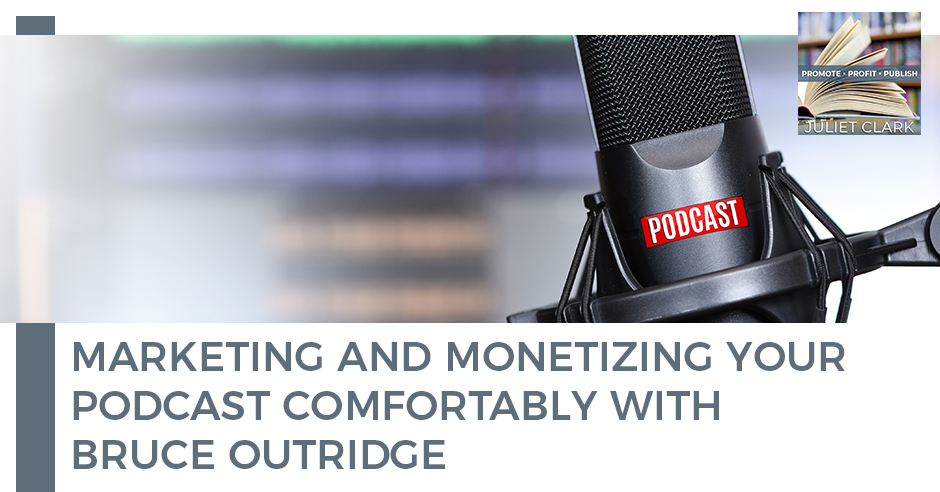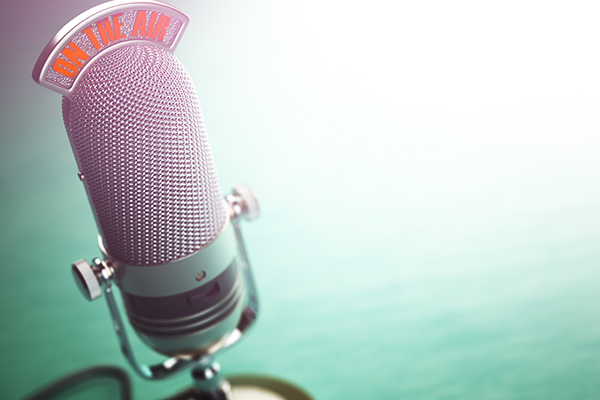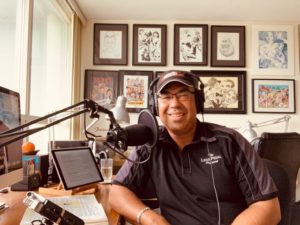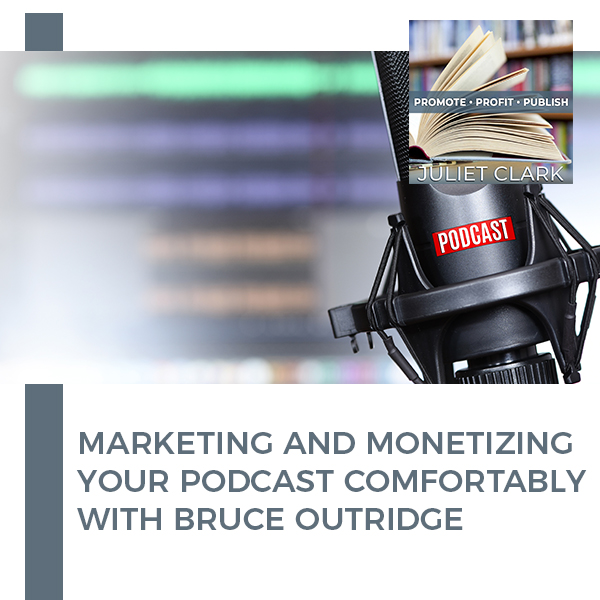
Podcasts are taking the airwaves by storm, especially these days when everyone is seeking for fresh information while being stuck at home. However, the common question is – how are podcasters earning from their shows? In this episode, Juliet Clark interviews Bruce Outridge, author, consultant, speaker, and the host of Cashing in on Creativity Podcast and The Lead Pedal Podcast for Truck Drivers. As an artist and a trucker, Bruce is a man of many trades who believes in the power of podcasting in relaying information about his many passions in life. Learn how he is getting ahead of his numerous business ventures and learn how monetizing your podcasts the right way can help you reap great rewards.
—
Watch the episode here
Listen to the podcast here
Marketing And Monetizing Your Podcast Comfortably With Bruce Outridge
Our guest is a little bit different. His name is Bruce Outridge. He’s an artist, author, consultant and speaker. He’s been a professional cartoonist for over a decade and is the author of four books on business and leadership. He’s also a business marketing consultant and speaks to groups to inspire them how to communicate with their audience. His background for all this is unique. He is the host and producer of two podcasts, the Inspiring Youth Television Show and has been a columnist and social media expert for the industry since 2007. All of this, his most popular podcast is the result of being 25 years as a truck driver. Welcome, Bruce.
Thank you.
It always astounds me how many different types of podcasts there are out there. I was at the gym and I started listening to an Irish history podcast. Who would have known that it’s super interesting because my whole family is Irish? There are podcasts on everything these days.
I follow them all on my Twitter account. I don’t listen to all of them. There are many different titles and people doing stuff that I never would have dreamed. I still can’t dream of it because I’m more business and careers, but there are some interesting ones.
Tell us how you got started in all of this.
I started drawing when I was ten years old. I did that through my teenage years and then went into trucking and continued that for 25 years, driving a transport truck. I got promoted into being in charge of the fleet, the corporate world, and realized I hated it. I decided to quit and start an art business. Everything I’ve been told to do, whether I’ve been told to be an artist, when I wanted to be an artist, everybody says, “You can’t be an artist.” When I said I’m going to get in the trucking industry, everybody said, “You won’t make any money. You don’t get into the trucking industry.” When I said I’m going to be a full-time artist, they all said, “You won’t make any money as an artist. You’re starving.” The same has gone on for podcasts, books and everything else. I do whatever I feel like doing. Some make money, some don’t and some are better than others, but it’s fun all the time.
That’s so funny you said that because it reminds me of the Geico commercial where the couple is like, “You’re an art major. How are you going to make money with that?” I remember my parents saying the same thing in college with what I majored in like, “How are you going to make money at that?” Why do you care?
The thing is when I look back at all my work, it looks very segmented. When you say truck driver, a podcast and television host, it looks like I’m all over the place. At the end of the day, it leads to one point. I like to show people that if you hear someone who’s done it, if you want to do something, it’s hard work. It’s not easy. As you know, it’s not easy to do publishing, podcasts and stuff, but if you’re willing to do it and you want to do it, you can do it. There’s somebody who’s done it that can show you the way. That’s all I’m doing in a lot of my stuff. My trucking podcast is Business and Careers. If somebody wants to have a good career as a truck driver, that’s what podcast is for. Cashing in on Creativity Podcast is for artists. How do you build a business? If you want to be a cartoonist, how do you do it? Who’s done it? There’s Tom Richmond. There are all sorts of artists that I’ve interviewed of how to do it. Musician is the same way.
It reminds me, somebody had me tell my whole story. I was reflecting on when you’re in the moment of that story going from tracking to whatever that next step is, you never think about, where is this leading to? When you’re at that point and then you look back, you’re like, “It all makes sense now.”
You have to be older like myself to figure that out. I’ve got a mantra, “Just get started.” Everybody’s trying to figure out the end game and if they don’t see the end game, they don’t start. You learn so much along the way as I’m sure you have in your career, all the different positions. You were talking toys and everything that you’ve done before that you’ve learned marketing and all of that through that. If you hadn’t started in that role, let’s say you decided I’m going to be a waitress because I don’t see what else I can do in life, you wouldn’t have learned all this stuff. You wouldn’t be where you are now. I wouldn’t be where I am now either. I didn’t know anything about podcasting. I decided I had a message I wanted to share and I didn’t worry about monetizing it. My trucking podcast has been going on since 2015. I did it for a few years for free. I got tired and now we have sponsors against it and everything. It can be done.
Everybody is having trouble with monetization because they are looking at what is being done online. Share on XComplete transparency, I was a waitress in college and I was a bad one. Get your own damn ketchup.
I would be that way too, which is why I’m not. I used to be cook. I was a cook at a fast food restaurant. It doesn’t matter. If I had listened to all the people who said, “Don’t go there,” I wouldn’t have been in the trucking industry, which I’ve loved. I love it to this day. I still have so many friends in the industry. I didn’t do my art for a lot of years. There’s eighteen years of trucking where I never lifted a pencil. It’s not until I went through a divorce in my 30s that I got back into my art. I didn’t do it the whole way through, which is, I would have been a lot further ahead.
You bring up such a great point, “Just get started.” I was at a podcasting event and everybody around me was there because they wanted to have a podcast. I could tell that probably three quarters of them were going to get into perfection mode and never get it started because they had to have all these pieces in place. You have to open up a microphone, Zoom and do it.
The average podcast doesn’t get past twenty episodes. You and I are both past twenty episodes, but there was a point I say 100 episodes. You’ve got to get to 100 in anything. For podcasts, I believe 100, you find your voice. If you go and do website design, you probably have to build 100 of them before you get good at knowing how things work and where they should go. Everything takes time. I’ll tell someone in networking event, come to this group for a year before you expect any business. Most of them will not show up after the second time if they haven’t gotten business. I’ve gotten business for years, but I was willing to show up for a year before asking anybody for business. You’ve got to do that long-term game. That’s how this works.
We have our Marketing Monday Mixer and we talked about this thing. Having that longevity in, “I’m going to commit to doing this for X amount of time and it has to be a good amount of time,” and not getting distracted by the shiny objects in the meantime because that diversions going to make your path so much slower. What I love about this, and tell me if yours was bad too, is I find with podcasts that people will jump in someplace in the middle. They find like, “That caught my interest,” and then they start at the beginning and your beginning one is probably one of your worst.
I don’t take any of mine down. You can go back to episode one and it probably sounds horrible. I remember my wife going, “What’s he doing? He’s talking in a room to himself.” Mine was a solo show. I didn’t even expect it. Now it’s mostly interviews, but it was a solo show at the time. I got to 100 episodes and I almost canceled my show. My biggest podcast, I canceled at 100. I had been told by all the gurus that you have to have all this engagement. If you’re not getting emails, it’s not successful. Nobody is listening and understand all of that stuff. I got to 100 and I wasn’t getting any emails. I said, “No one is listening to this.” I turned it into a music episode and I kept going. We’re now at 450 episodes of that podcast. You have to keep going.
I know one of my mentors in the podcast industry, podcasts five days a week and it blows me away. He’s like on his 550th episode. I don’t know that I’m quite that good. You talked by yourself for 100 episodes?
I had a few guests here and there, people I knew in the industry, but I didn’t have a plan. I didn’t say, “This is going to be a solo show or this is going to be an interview show.” All I did was say, “I’ve got a message, I want to talk to truck drivers. I’ve worked for good companies. I think I can help them have good careers.” That was it. At first, it was a few people I knew in the industry that were willing to be on a microphone and I would fill in with my own topics. Now I’ve got people approaching me all the time. I try to get a solo show in because it’s all interviews all the time.
I must be boring because my listenership is not as much up when I do a show by myself. What does that say about me? You probably should send me some messages and tell me.
They’re all different. A lot of times it’s the topic. As you know in marketing, sometimes it’s as simple as the title and the picture people go through. You’re always struggling with that. I wouldn’t think that, but I think if you’re willing to, for myself, put out the message, put it in the work, be determined. Both of my shows have over 150 episodes. One is 450 and the other one is at 170. They both been going for years. One is not monetized at all. I have not made a dime off it, but it’s a way of giving back. It’s the same with my television show. I don’t make any money. It’s a community television show. There’s no money there. My one podcast is making any money, but they’re all fun to do. They’ve all given me connections. If you go to someone and say, “Can we meet for a cup of coffee?” they go, “Do I have time for a cup of coffee?” If you say, “Do you want to be on my show?” they all say yes because everybody’s looking for marketing.

Podcast conferences are great avenues for gathering more podcasting tips.
I met you on LinkedIn. I reached out and said, “I’d love to do a pod swap.” That’s probably the most fun of it is I get to talk to so many different people that I normally wouldn’t. Do you go to podcasting events?
I’m scheduled for one. We booked the hotel for Podcast Movement. In Canada here, we don’t have a lot of them. I’m at truck shows. I’m at a lot of events, not podcast events. I’m trying to get to some podcast events, but I am at a lot of truck shows and that’s where my people are. I do a lot of interviews.
Is that the one that’s monetized?
Yes. I go there. I have my sponsors and I interview them. I interview people in the crowd. I do video production. I’ve got my own equipment. I do video production for a lot of these events and that’s how I get my name out there. I don’t have to go. A podcast event for me is not necessarily where I would go there for my own information. I wouldn’t go there necessarily to find other people to connect. I’m not saying it wouldn’t happen, but that’s not my focus of going to a podcast conference. Mine is more to get information and get tips.
That’s mine as well. Although our quiz is a podcast product. I go more for my own learning as well and meeting other people. It’s fun to hear how they’re monetizing. One of the things that happened as a matter of the reach out, I met you, but I met all of these people that I wasn’t an appropriate guest for their show, but I was blown away. There’s a whole podcast on chocolate. Who doesn’t love chocolate?
I want samples if I’m a guest on that show. I expected mailing.
Maybe I’ll go back and volunteer to be on the show to get the chocolates.
I want payment, but I want it in chocolates.
I’m a paid speaker because I’ve got chocolate in exchange for speaking.
That’s the other thing. I’m part of an association here. They’ve got NSA, National Speakers Association in the States. I’m part of the Canadian version, which is CAPS, Canadian Association Professional Speakers. I get a lot of guests for my show from there because they all are trying to market themselves. A lot of them have interesting stories and a lot of great information to share. It doesn’t matter what the group is, go wherever you want to go. I could meet someone on the corner. I don’t even have to go to a group. I go to a lot of stuff that is of interest to me. I always meet somebody. My Chamber of Commerce, I meet people all the time.
Everybody's trying to figure out the end game, and if they don't see the end game, they don't start. Share on XI don’t even go to the Chamber of Commerce, but I do go to a lot of networking. That’s something to think about. For most of you, you’re trying to be online marketers, but online doesn’t mean that you never leave the house. You have to go out and build some relationships out there.
Passive income and all of that that people say, “It’s online. I don’t have to do anything,” that is a lie. Everybody I know that’s got courses or podcasts or whatever it is they’re doing is working their tail off behind the scenes. I like being with people, in front of people. I go to a lot of networking events and that’s how I build my audience. It may not be as quick as throwing a Facebook Ad out there, but the people I have are core people. They stay with you, listen and comment. I’m building it a bit slower than maybe someone would, but at the same time, I’m building a stronger audience, which is what the advertisers want to do.
Tracy Hazzard and I have the Monday Marketing Mixer show and people were asking us probably 3, 4 weeks in how many people are listening? We could see the stats over on Live Leap, but nobody was coming on. We have a live link where you can come on and nobody was coming on. This is why you need to wait. It’s been months and both of us are fairly well known. We’re starting to have people jump on the Zoom link with us and come on the show. That’s a perfect example of you have to wait. I loved what you said about online marketers who think it’s no work. I have a joke. The first day you’re an online marketer, you’ve quit your job, showered and you’re at your desk. You’re so stoked. You have all this freedom and then by month four, you’re not showering. You’re exhausted. You look like hell. Even your dog is sitting over in the corner like, “Dude, shower.” It’s a lot more work than people think it is.
My wife has seen it over the years. I remember back in 2008, I put out a comic book series for kids and the first thing she said is, “How are we going to make money from comic books?” I said, “Don’t worry. There’s Todd McFarlane. There’s Stan Lee. There are all these famous guys. We’ll make it.” I find out that you cannot make it unless you’re distributing 200,000 at a time. But I got a lot of business from those comic books and that’s how we made money. It’s the same with this. She goes, “How do you make money from a podcast?” I don’t know. I’m going to start it and I’ve got enough connections in transportation. Something will happen.”
It took two years and now something has happened. She sees me on social media. At first it was like, “Why are you taking so long to post on social media?” It takes me an hour each morning to post to my social media feeds on my podcast. Another hour at night, usually I go back and I answer comments and all that stuff. She now sees the amount of work that goes into it, but she also sees the check come in and go, “This is from the podcasting. Now I know why he’s doing that.” She’s learned a lot of that over the years watching me, that she had never experienced that part of the business before.
When I go to podcast events, that’s the biggest thing people are looking for is how can I monetize this? I went to a pitch I was invited to. They only allowed the top four to pitch. All of them wanted to know, “How am I going to make money from this?” It can be challenging sometimes, especially in areas like you’re talking about with the comic books. I’m stunned at how many people are doing those type of podcasts and it’s a lot of competition.
I’ll tell you why everybody’s having trouble with monetization. It’s because they’re looking at what is being done online. When people look at how do you monetize a podcast, it’s usually sponsors or Patreon or one of those programs, something along that line. How many people have gone out the door to their local retailers in their own neighborhood with a podcast, got an interview and said, “Are you interested in advertising with me?” I’ve made up my own programs. I don’t do the traditional format of so many impressions and all of that.
I don’t make any money that way. I make money because I put a package together and I said, “I’m going to give you this and this. It includes social media. It includes everything. Here’s how much it is a month.” I bet you most people are looking online on Facebook to people they don’t even know, hoping they’ll advertise instead of going out their front door to people who know them in the area and saying, “I got a show. Are you interested?” Maybe you make your show very specific to your neighborhood, but you’ll probably have a ton of people that want to have sponsors. It’s not hard to monetize. You have to be creative in your thinking.
You do have to be very creative. Here’s one way I see people monetizing that I don’t care for is when they call you and they say, “I have an episode available,” and they charge you to be on it. I don’t know why I don’t like that because I look for good guests. I don’t charge people. I go out and look for the best guests I can find. That serves people much more than me saying, “I had someone call me a couple of months ago and blow smoke at my you-know-what about how great I was. Did I want to do this for $500?” and I was like, “No, I’m not that great.”
I had one a few months ago. It might be the same place, but they wanted $1,500. I even hooked up on LinkedIn. I was in until they said the price. I said, “This doesn’t sound right.” I may as well advertise on somebody’s show and pick the show. That show was not necessarily for me.

Monetizing Your Podcast: You may not build your podcasts fast, but make sure to build it comfortably.
For me, I haven’t monetized in that way. I monetize more, I pick up clients from it, which is more my goal. I haven’t even looked for sponsors. My coach gave me a website to go to and I haven’t done anything with it. I don’t know if I want that responsibility.
Sponsors are no easier. It’s a lot of work. You now have to make sure the sponsors are happy. You got to make sure the audience is happy. It’s a very fine line. I keep trying. I’m not saying I’ve got it all figured out. We’ve had sponsors for about a few years now so I’m happy. A lot of them that came on have stayed so they enjoy what we’re doing. I don’t know if I’ve got it figured out. I don’t know if they’re going to be there next year. I keep trying to make it better, be better and hopefully they’ll stay or I’ll get new ones.
Do you send your podcast out to your list?
I don’t have a huge email list. Most of my lists are either the social media, their subscribers or what have you. I’ve always struggled with the email list because I don’t send out a ton of emails. I even tried this a couple of years ago. I started a cartoon store. I went through the whole program where you’re supposed to send out these targeted funnels of seven emails and all of that stuff. I hated it. I don’t like it for myself and I’m going, “Why am I going to do this for people because someone else told me to?” I send out a newsletter once a month. It’s some tips and stuff. I don’t build my list that way. Maybe that’s good. Maybe that’s bad. The people who are sending me all of those, I’m not even reading them anymore. They think they’re working, but they’re not. I’m not reading. I delete them now, but I can’t get off their lists for whatever reason. I probably signed up three times somehow. I probably wanted the free book or whatever they were giving away and now, I’m not even using it.
When I’m talking about smart lead magnets, it was the dumb lead magnets that got us into this mess, where we have these unresponsive lists. That’s why we use the quiz because we call it a smart lead magnet. Think about what Bruce said. How many times did you get on somebody’s list and you never opened anything because you wanted that free book or whatever it was? Thank you for saying that. That was totally unsolicited, but that’s what I preach with this. The seven emails, I don’t think they work either. I send out my podcast as content once a week to my list and I deleted about 5,000 people from my list. I wanted a responsive list and I have a very responsive small list. I hate it when the JV partners call up and like, “Will you promote this? How big is your list?” I was like, “No, I won’t promote it. My list isn’t that big.”
I probably got three newsletter lists going. One of them for my art business. You can’t sign up for it. If you’ve worked with me, I usually put you on the list and it’s an article once a month to keep top of mind. That’s it. People can sign up, but I don’t do much with the list of the lead magnets. The way I do my business now is I do it based on what I would do. I’m very big listening to all the gurus and when I started my podcast, I was told you had to do it daily. I started daily and I almost killed myself. I went down to once a week and now it’s a daily show now. I’ve got three main episodes a week on my trucking podcast and all the sponsors stuff in between.
There’s content coming out every day, but I built up to that. Now it’s comfortable for me because I know why and what I’m doing. At first, I was told you’ve got to have every day. That’s how you make it big. That’s not how you make a big. Now, I do what I want to do. If I only email once a week, I’m going to send them out once a week. If I only want to do one show a week and that’s all I have, then I’m only going to do one show a week. Everybody’s trying to do what’s right for everybody else. Do what’s right for you. You may not build it this fast, but you’ll build it comfortably, which is a secret.
The key is there consistency. Whatever you choose, consistently try to do that. That’s why my show is once a week, but I’m thinking about bumping it. I’ve gotten a little bit ahead and I’m thinking this might be the time to bump it up since I’m getting better guests from LinkedIn than I was before.
It depends. My Cashing in on Creativity Podcast is once a week and I’ve kept it at that because that’s comfortable. They’re not even long episodes. I try to always keep my shows around 30 minutes, but sometimes it’s ten minutes and sometimes it’s 45 minutes. It depends on if I have a guest or not. I do what’s comfortable for me. With my bigger podcast, I add an episode when I get enough sponsors to fill it. I’m at a comfortable spot. All my sponsors full right now. For me to bring on more sponsors, I don’t want more and I try to keep it to two sponsors per show. If I get two more sponsors or another sponsor with a big package, I might add an episode a week to do that. I don’t want to because I know how much work that it’s going to be. I’m trying not to. I’m creating a waiting list before I add another episode.
It’s always a balance. Everybody gets into this because they want more free time. You have to balance, how much am I doing this well with it?
If you're building a podcast, your time is for the taking. You should be paid for that in some way. Share on XIt’s not free time. Nothing is free. Your time is worth something. If you’re building the podcast, that’s time you’re taking. You should be paid for that in some way.
Where can we find you? Where’s your podcast at? Most of my audience would be interested in the Cashing in on Creativity.
We have seven websites for our business, but here’s the easiest one. Go to BruceOutridge.com. Everything is linked off of that. You can go there and you can see all of the podcasts. Cashing in on Creativity has its own, CashingInOnCreativityPodcast.com, but BruceOutridge.com is probably the easiest place to start to learn about me. You can get links to all the podcasts from there. It’s easier than putting seven websites in your show notes.
Thank you, I appreciate that. Thank you, Bruce. It’s been great having you.
You’re welcome. Thanks for having me on. I’ve been loving your podcast. I’m glad that you said that you have this mixer thing on Monday nights. I was listening to your podcast. The way I do podcasts is I normally don’t necessarily subscribe. I pick episodes that I’m interested in learning that week on certain topics. I picked about four of yours out. I’ve been listening to them and they go into, is it like a food menu? I’m going, “We were talking marketing. How did we get into chocolate? She was talking bruschetta. That doesn’t make sense.”
Tracy and I have a mutual client, Chef Marie. It was a mixer. It was going to be happy hour somehow. Neither of us drink, we ran out of drinks quick.
She seemed to know a lot about rum on the episode I was listening to.
She drinks more than I do. I don’t drink at all, although I can talk tequila. Marie gave us a new stack of recipes and we’re like, “I don’t even know if we can fix it in.” I don’t know if you’ve gotten up to Scott Carson. Scott got on with root beer and he said, “I don’t have a fancy drink. It’s me and my root beer.”
Is Scott the one that does all the noises, the pig noise and all? That was the episode I was listening to at the gym.
Some of those mid Monday Mixers we’ve incorporated in, if you want to get more of the Monday Mixer, go over to Marketing Monday Mixer on Facebook and like our page and you can sign up and get in on those live. They’re Monday at 5:00, Mountain Time.

Monetizing Your Podcast: You don’t have to make sure that the sponsors are happy; you have to make sure the audience is happy. It’s a very fine line.
I was not catching the connection between the marketing and the mixer. I’m glad you’ve explained that. That makes sense.
Tracy and I started it. We had a program called Lunch Like A Pro. We were showing our students how to do it, and we’ve kept doing it.
I know I’ll start doing it too. I didn’t know. Like I said, it’s funny. Maybe I should start at the beginning and subscribed, but I pointed in the middle, like you were saying.
There you go and leave us a review.
Thanks very much, Juliet.
Important Links
- Bruce Outridge
- Inspiring Youth Television Show
- Cashing in on Creativity Podcast
- LinkedIn – Bruce Outridge
- Podcast Movement
- National Speakers Association
- Canadian Association Professional Speakers
- Monday Marketing Mixer – Facebook
- CashingInOnCreativityPodcast.com
- BruceOutridge.com
About Bruce Outridge
 Bruce Outridge is an artist, author, consultant, and speaker. He has been a professional cartoonist for over a decade, author of four books on business and leadership, a business and marketing consultant, and speaks to groups to inspire them and help them communicate with their audience.
Bruce Outridge is an artist, author, consultant, and speaker. He has been a professional cartoonist for over a decade, author of four books on business and leadership, a business and marketing consultant, and speaks to groups to inspire them and help them communicate with their audience.
He is the host and producer of two podcasts, the Inspiring Youth television show and has been a columnist and social media expert for industry since 2007. This all began after a 25 year driving career as a professional truck driver and fleet supervisor
Love the show? Subscribe, rate, review, and share!









Leave A Comment